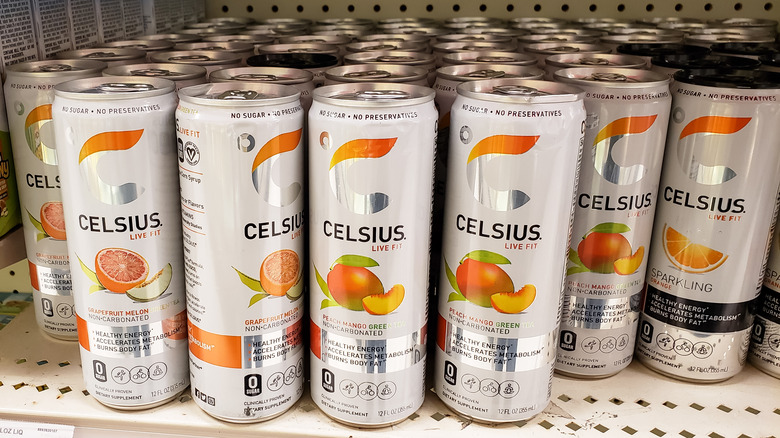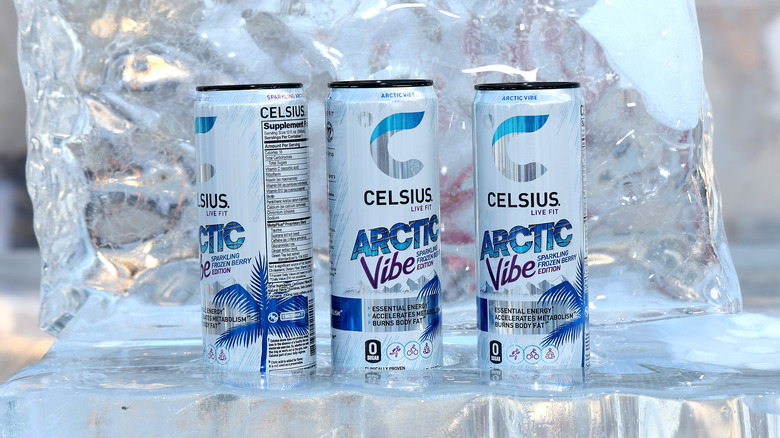Are Celsius Energy Drinks Actually Good For You?
Energy drinks have come a long way from the thick, weird-tasting beverages that made your heart race for hours. Today's offerings are delicious and even promise a variety of health benefits. One of the most popular drinks on the market is the Celsius energy drink, which boasts the ability to help you burn more calories by boosting your metabolism. But is this option actually good for you?
According to the company website, Celsius "stands out against other brands" because their drinks are made with "healthier" ingredients like ginger and green tea. Each drink contains seven essential vitamins, and has no sugar, aspartame (an artificial sweetener), high fructose corn syrup, artificial preservatives, colors, or flavors.
Other notable ingredients in these drinks include guarana and taurine. According to HighYa, guarana is a plant from Brazil that is full of antioxidants and may help with digestion and weight loss. Taurine is an amino acid found in fish and dairy products that is believed to support heart health and ward against diabetes. The sparkling drink also contains chromium, which is a mineral that may help stabilize blood sugar levels and keep cravings away.
Can Celsius drinks help you lose weight?
The most widely promoted benefit of Celsius drinks is their apparent ability to help you boost your metabolism and burn body fat. The secret, according to the company, is in their "MetaPlus® blend" of ingredients, which includes taurine, guarana extract, glucuronolactone, ginger extract, green tea leaf extract, and 200 mg of caffeine in each can.
The company cites six different studies on their website that show promising evidence about Celsius's thermogenic properties. Health experts have agreed that these studies seem legit, although note that the benefits will be short-lived. Joanne Ikeda, a nutritionist emeritus at the University of California at Berkeley, told ABC that thermogenic beverages can boost the human metabolism temporarily.
"However," she said, "There is no evidence that anyone has lost weight or maintained their current weight by drinking thermogenic beverages as a component of their diet."
Celsius drinks aren't a miracle beverage that will lead to a lighter, healthier body. However, they contain a lot of good ingredients and can be used to help you get in a good workout and burn more calories in the short term. Incorporating them into an otherwise healthy lifestyle certainly can't hurt — just, as always, consume them in moderation, and be sure to talk to your doctor before increasing your caffeine intake.
Vitamins and minerals in Celsius drinks
Another reason Celsius energy drinks are believed to be healthy is that they contain several vitamins and minerals that come with various health benefits. According to the Celsius website, one can of Celsius contains 67% of your recommended daily intake of vitamin C. This vitamin plays a huge role in our overall health and can help with boosting the immune system, protecting against cardiovascular disease, preventing eye disease, and more (via WebMD). One Celsius drink also contains 131% of your recommended daily intake of riboflavin. Riboflavin is necessary to help the body break down the food you eat to produce energy and allow oxygen to be used efficiently (via Live Science).
You'll also find over 100% of your daily recommended intake of vitamin B6 and B12 in a single can of a Celsius energy drink. According to Harvard T.H. Chan School of Public Health, vitamin B6 supports immune function and brain health while vitamin B12 is important for red blood cell and DNA formation. Perhaps the most notable vitamin in Celsius energy drinks is biotin, of which you'll find 1000% of your daily recommended intake. Biotin helps with the health of your skin, hair, eyes, liver, and nervous system (via Healthline). This vitamin is water-soluble, so while getting this much biotin from a single energy drink shouldn't harm you, most of it will pass through your body while you urinate because you will only absorb a small amount at once.
What is a thermogenic?
According to the Celsius website, these energy drinks contain thermogenic properties. This means that the drink claims to raise your body temperature slightly to help you accelerate your metabolism and burn more calories. While thermogenic supplements may have some positive results, there is little evidence to suggest that they can make a substantial impact when it comes to total calories burned (via Healthline). Celsius contains several ingredients that are considered to be thermogenic supplements, including caffeine and green tea.
Caffeine, found in many energy drinks, increases levels of adrenaline in the body. It has also been found to reduce your appetite and boost your metabolism (via PubMed). However, the actual number of calories that caffeine can help you burn is relatively low, so it probably won't make a significant difference on its own. Green tea contains caffeine as well as another compound called epigallocatechin gallate (EGCG). EGCG enhances the effects of caffeine by helping adrenaline break down in the body more slowly to lengthen its duration. A 2011 study found that consuming green tea supplements can increase your metabolism and the rate at which you burn body fat for 24 hours after ingestion. But again, like with caffeine, the total amount of calories you can burn from green tea is relatively low and most likely will not cause a significant change in how many calories you burn throughout the day.
How often can I drink Celsius drinks?
Even though Celsius drinks are healthier than many other energy drinks on the market, they still contain high amounts of caffeine and other stimulants that should be limited in your diet. One can of a regular Celsius energy drink contains 200 milligrams of caffeine (via Celsius). According to the US Food and Drug Administration, adults should limit themselves to 400 milligrams of caffeine per day. That equates to drinking only two Celsius energy drinks per day if you ingest no additional sources of caffeine.
It is also important to note that while Celsius does list its caffeine content, it does not list the exact amounts of each ingredient in the beverage. This drink contains a "MetaPlus® proprietary blend" of taurine, guarana extract, caffeine, glucuronolactone, ginger extract, and green tea leaf extract. The total amount of this blend is listed as 1.18 grams, but it is not clear how much of each ingredient is in each can. Everyone has different tolerances to different ingredients and you may find that you need to limit your consumption of this drink based on your unique tolerance to its various ingredients (via US News). When trying out a new product, it is always smart to consume small amounts at first and gradually increase your intake if you experience no ill effects.
Is Celsius healthier than energy drinks like Monster and Red Bull?
The term "healthy" is subjective, so deciding whether or not to drink a Celsius energy drink over another brand like Monster or Redbull will depend on how you perceive each ingredient. If sugar is your main concern, for example, you'll find that Celsius drinks are the healthier option. Celsius energy drinks contain zero grams of sugar, according to the company's website. A can of Red Bull contains 27 grams of sugar, which is significantly more than, well, none. A Monster energy drink contains almost twice as much as that, with 54 grams of sugar in a can (via Livestrong). However, both Red Bull and Monster offer products made with artificial sweeteners and consequently contain no sugar, so you can get around this issue if you choose the right flavor.
The main factor that arguably makes Celsius energy drinks healthier than others is the vitamin content. Celsius energy drinks contain vitamins C, B6, and B12, riboflavin, and biotin. These vitamins and minerals are responsible for many important functions in your body. While Red Bull and Monster energy drinks are both rich in B vitamins, they do not contain the array of vitamins and minerals that Celsius energy drinks feature. From that standpoint, it's safe to argue that Celsius energy drinks are healthier than many alternatives.
Are there potential side effects to drinking Celsius?
Celsius energy drinks (and many other energy drinks) contain multiple ingredients that can cause various side effects. One can of a regular Celsius energy drink contains 200 milligrams of caffeine (via Celsius). Caffeine is a stimulant that can lead to increased alertness, energy, and focus. However, according to the Mayo Clinic, it can also cause side effects like anxiety, headaches, insomnia, and heart palpitations. While most people can safely consume moderate amounts of caffeine, some people are more sensitive to its effects and can experience negative side effects at lower doses. It is recommended that adults do not drink more than 400 milligrams of caffeine per day.
Other ingredients in Celsius that may cause side effects include taurine and guarana extract. According to Oxidative Medicine and Cellular Longevity, these ingredients can cause side effects similar to those of caffeine. It is also smart to be aware that the U.S. Food and Drug Administration (FDA) does not regulate energy drinks, so Celsius drinks are not FDA-approved (via U.S. News). The FDA regulates certain ingredients found in energy drinks, such as caffeine, but it is not required that the final products be approved by the FDA before being sold to the public. While this doesn't necessarily make them dangerous, it leaves more responsibility to the consumer to be aware of the ingredients and how they affect each person individually.







